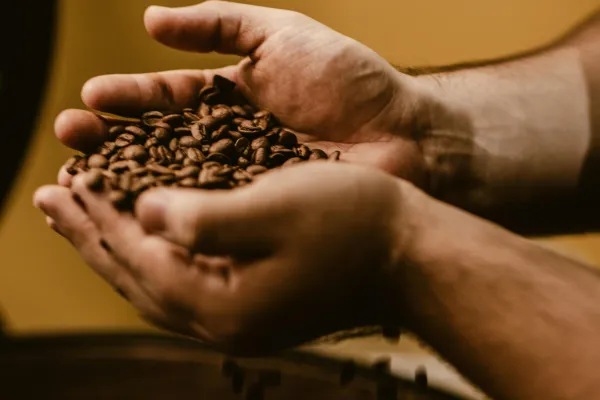
What’s the Human Cost of Your Morning Coffee?
What’s the Human Cost of Your Morning Coffee?
We’ve seen a growing movement to clean up the chocolate industry, thanks in large part to initiatives like Be Slavery Free and its Chocolate Scorecard, which have shone a light on human rights concerns in cocoa supply chains.
Brands such as Tony's Chocolonely have set a benchmark for ethical chocolate, showing that paying fair prices, respecting workers’ rights, and committing to transparency is not only possible but smart business. From a mission-driven startup in 2001 to a global success today, Tony’s demonstrates how embedding purpose into business can drive real change.
But while the spotlight’s been on chocolate, another global habit — coffee — hides its own bitter truth.
But what about coffee?
Coffee is one of the world’s most consumed commodities and for many of us, it’s how we start every day. Yet behind the beans lies a troubling reality: like chocolate, coffee’s history is rooted in colonialism and slavery. And according to multiple investigations, some of those injustices persist in modern forms.
Modern Slavery in the Coffee Supply Chain
Unlike historical slavery where individuals were legally owned, modern slavery is defined by the exploitation of people for personal or commercial gain. It includes forced labour, human trafficking, debt bondage, and other forms of coercion. Victims lose their freedom, often through deception, threats, or manipulation.
In coffee-growing regions around the globe, reports from human rights organisations describe men, women, and children working in unsafe and degrading conditions, and are often unpaid or underpaid, and living in abject poverty.
For example, a 2024 investigation by SOMO documented widespread labour exploitation on certain Brazilian coffee farms. These farms were found to be linked, through supply chains, to major global coffee brands including:
Illy (Italy)
Jacobs Douwe Egberts (JDE) (Netherlands)
Nestlé/Nespresso (Switzerland)
Starbucks, McDonald’s, Dunkin’ Donuts (United States)
Importantly, many of these farms were certified as “sustainable” or “responsible” through programs such as:
Rainforest Alliance¹
4C (Common Code for the Coffee Community) ²
Nestlé’s AAA Sustainability Quality Program³
Starbucks’ C.A.F.E. Practices⁴
Nestlé/Nespresso also holds B Corp certification (since 2022)⁵, prompting campaigners and analysts to ask:
What’s the gap between certification standards and the lived reality of workers in certified supply chains?
What Can You Do?
Modern slavery is complex, but not inevitable. Whether as consumers or business leaders, we can influence change.
Awareness is the first step. Recognising that labour exploitation can be embedded in everyday products allows us to make more informed choices. Just as movements for diversity, equity and inclusion (DEI), plastic reduction, climate action, and ethical investing have gained traction, so too can ethical coffee sourcing.
Practical Actions You Can Take:
☕ Ask your local café where their coffee is sourced, and what they know about labour practices in the supply chains.
🏢 If you manage a workplace, review whether you or your supplier sources coffee ethically.
🛒 Support brands that work directly with growers and cooperatives to ensure fair labour conditions.
¹ Home | Rainforest Alliance
² 4C | Standards | CommonShare
³ Discover the AAA Sustainable Quality™ Program | Nespresso
⁴ C.A.F.E. Practices: Starbucks Approach to Ethically Sourcing Coffee - About Starbucks
⁵ Nespresso achieves B Corp certification | Nestlé Global
A Selection of Ethical Coffee Brands Available in Australia
(As reported by various ethical consumer guides)
Final Thought
Coffee should fuel our day, not injustice.
By asking questions, supporting ethical sourcing, and holding brands accountable, we can help create a coffee industry that values not just beans, but the people behind them.
#ModernSlavery #EthicalCoffee #SupplyChainTransparency #HumanRights #SustainableSourcing #ResponsibleBusiness #BrewResponsibly
Learn More
For further reading and source articles:
Public Eye (2025) Modern slavery at Nestlé’s coffee supplier | Public Eye
SOMO (2024) Bitter brew - Modern slavery in the coffee industry - SOMO
RightsDD (2024) Modern Slavery in Brazil’s coffee sector. What businesses need to know. | RightsDD
Coffee Watch (2024) Coffee and Human Rights Abuses | Coffee Watch
Borgen Project (2020) Bitter Origins: Labor Exploitation in Coffee Production - The Borgen Project
Byline Times (2020) From Bean to Brew — The Hidden Cost of Coffee Slavery – Byline Times
Human Trafficking Search (2020) There Could be Labor Exploitation in Your Coffee Cup: Here’s How It Got There - Human Trafficking Search
Reuters (2019) Some of your coffee is picked by slaves: investigation - National | Globalnews.ca
Ready to redefine what responsible business means for your Organisation?
Let’s get started on crafting a brighter, sustainable future with Cogent Impact Advisory at www.cogentimpact.com.au
